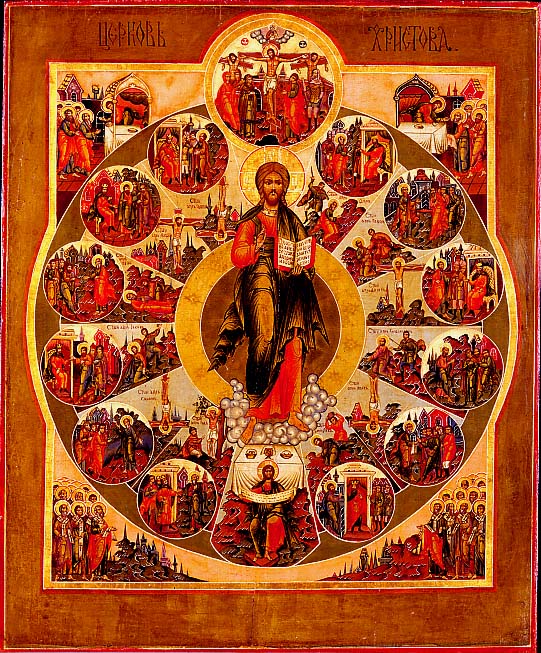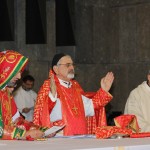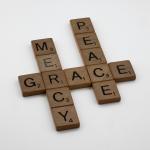
Chase Padusniak has done it again with another hit piece. This time, he’s written a primer on his Patheos blog on the Eastern Catholic Churches, and it is a very interesting piece especially for our interlocutors in the Latin Church to get to know Eastern Catholics on our own terms. Of course, it is nakedly opportunistic of me to use his post as an opportunity to dish out some of my own thoughts on Eastern Catholicism on my own Patheos blog, but he tells me that he is excited, and I suppose that the excitement of the original author can cover a multitude of sins.
Chase’s primer is especially helpful for sorting through the various identities that circulate through Eastern Catholicism. He parses through what is a ‘rite,’ why Eastern Catholics do not belong to ‘rites’ but to ‘churches sui juris,’ why I am technically a ‘Ukrainian,’ and why it’s generally not good to use the generic ‘Eastern Catholic’ label for us:
Relatedly, this is why it’s often not best to merely call people “Eastern Catholic.” It’s true; we are Eastern Catholics, but we also belong to particular rites, and within those rites, particular Churches. Syriac Catholics, who use the West Syriac Rite, are Eastern Catholics as much as Syro-Malabars, who use the East Syriac Rite, who are Easterners as much as Ethiopian Catholics, who use the Alexandrian Rite (and then the Ge’ez Sub-Rite within that rite—it’s complicated!). But as you can see, the differences that separate our individual rites, let alone our individual Churches, are meaningful. For ease of convenience, then, we can be “Eastern Catholics,” but in order to feel truly respected, most prefer that outsiders try to learn about their particular patrimony in all its particular loveliness.
As you can see, that’s the hard (and wonderful) thing about this topic: Eastern Catholics are really diverse. Most would say it’s offensive to call them “Roman Catholics” (since they don’t use the Roman Rite). Some, however, are fine with the term. Some Byzantine-Rite Easterners prefer to be called “Orthodox in Communion with Rome” above all, since their traditions are effectively those of the Eastern Orthodox (since the Eastern Orthodox are also, generally, of the Byzantine Rite!), simply while in union with the Bishop of Rome.
In so doing, he leaves the door wide open for me to respond – or rather, to straight up explain myself – when, as he puts it, ‘Justin calls himself an “Eastern Catholic Guy,”‘ even though I belong to the Ukrainian Greco-Catholic Church. I think being a ‘guy’ is cooler than being a ‘person,’ and I am flattered at the re-hypostatization.
I prefer to be called ‘Eastern Catholic,’ and I think I should say a bit about why, aside from the fact that the temple in which I was chrismated actively calls itself ‘Eastern Catholic’ to confuse Chinese people in Richmond enough for them to come in. I want to make the case that there is something wonderful about being ‘Eastern Catholic,’ and it is maybe this: we are autonomous enough to be able to relate to each other even though we are all different. As I continue my riff on the term makrodiakonia in Eastern Catholic theological practice, I think this autonomy has a lot to say to our modern, contemporary world that is, at least on the surface, obsessed with this word. In this sense, I think the experience of Eastern Catholic churches can be helpful in discerning what ‘autonomy’ is and is not in the world today. I’m sure, of course, that this will draw the ire of some of my Orthodox-not-in-communion-with-Rome sisters and brothers – and as they read on, they may become even more worried about me – but I would implore those who are suspicious of everyone they lump into the category of the unia to hear me out to the end instead of knee-jerk reacting with words like ‘schismatic,’ ‘heretic,’ ‘bleeding wound,’ ‘latinizer,’ ‘Protestantizer,’ ‘modernist’ (this one, especially because I use autonomy – which is technically an Orthodox word, no? – alongside autocephaly?), and (my personal favourite, because I understand it the least) ‘Ukrainian nationalist fascist.’
As I start pursuing this autonomy line, I should probably say something about Chase’s portrayal of my autonomous self in the context of my church. This is a response to Chase Padusniak, so I could respond about my church ‘s ‘particular patrimony in all its particular loveliness’ by nit-picking Chase’s portrait of me as a ‘Ukrainian’ in a church named the ‘Ukrainian Greco-Catholic Church’ with a ‘Major Archbishop.’ I admit that I did say I was ‘Ukrainian Catholic’ in a widely-shared piece that was really about being under the omophor of bishops in the Ukrainian Greco-Catholic Church, but that piece got so worrisomely popular in my church that some of our church’s scholars shared with me privately some of their misgivings about it. Some of them told me to read Fr Andriy Chirovsky’s piece titled ‘What’s in a name?’ which carefully parses through our church’s internal debates about whether we really should be called ‘Ukrainian,’ or whether it might be better to call ourselves ‘Kyivan’ because we are the historic Church of Kyiv seeking the reunion of all churches founded by the baptism of Holy Volodymyr Equal-to-the-Apostles and refer to our church as the ‘Greek-Catholic Church of Kyiv.’
As for the question of what a ‘Major Archbishop’ is, I will let Archimandrite Robert Taft SJ take that one. Responding to the reality that the Latin Church will probably never recognize our church’s patriarch as a Patriarch, he suggests:
First, publicly declare the patriarchate. Second, request Roman recognition, but even if it doesn’t come, refuse all mail that doesn’t come addressed to the patriarchate. Don’t just pretend, but really do it. The Secretary of State sends a letter addressed to the archbishop? We don’t have any archbishop, we’ve got a patriarch. Send it back unopened, “addressee unknown.’
What this means is that I’d go further than Chase in some of his definitions: I am Kyivan. Our church is the Greek-Catholic Church of Kyiv. Our top guy in Kyiv is our Patriarch.
But the fact that our church gets to have all these debates about our name and affirm that we have a Patriarch even though Rome and Moscow don’t think so (for Constantinople, it’s hazy) gets to Chase’s point that we are one of the ‘churches sui juris,’ as even the Latin Church’s Code of Canons of the Eastern Churches acknowledges (especially in Title II). Sui juris is the Latin term for ‘of their own law.’ As the theologian Johannes Madey points out, it’s easy to get this term mixed up with the word ‘rite’; let me quote him at length, because there’s a quote in what I’m about to quote from Orientalium Ecclesiarum: More Than Twenty Years After that I find really illuminating:
As early as in 1942, E. Herman gave a definition of Rite which comes close to our understanding of ‘individual’ Church or Eccelsia sui iuris:
“A rite is a group of faithful who are governed by laws and customs of their own, based on ancient traditions, not only in regard to liturgical matters, but also in respect to the canonical order, and which group is acknowledged by the Holy See as autonomous and distinct from others.” (Madey, p. 30).
Madey takes issue with using the word rite for what Herman is describing because, technically (as Chase also says), a ‘rite’ is a liturgical culture, a way of doing things liturgically. You cannot belong to a way of doing things. You can only belong to a community that does things a certain way. A church is the fullest form of such a community, as a church has its own norms (laws, canons, policies, etc.), its own hierarchy that governs according to those norms, and its claim to apostolic succession (that it is in continuity with the earliest of early churches founded by the apostles). In fact, as we shall soon see, there is in ecclesiological fine print a distinction between a church (which I have described here) and an ecclesial community (which might not have some of the things in the fullest expression of church). What Madey is saying is that the Eastern Catholic Churches are churches – they have their own norms, their own hierarchies, and their own claims to apostolic succession – and on that note, they are governed sui juris, according to their own law.
That ecclesia sui iuris – is, if it is really governed according to its own law, with its own hierarchy, with its own narrative of apostolic succession – is (as Madey quotes Herman) autonomous.
As a church sui juris, my church is autonomous from the Latin Church. What this means is that we are both Catholic, and we are in communion with each other, but we are not the same church because we have a different set of governance norms with a different hierarchy that governs according to those norms. As Madey continues: ‘The Roman Catholic Church is not conscious of being sister Church to the Oriental Churches and should therefore not behave as if it were their mother dealing with minor daughters who have not yet reached the age of maturity. On the contrary, some of them are older than the Church of Rome which is the mother Church of all the local Roman Catholic Churches’ (p. 41). Put more starkly, what this means is that the autonomy of Eastern Catholic Churches sui juris is how the Catholic communion is at an objective level even if people in the Latin Church are not subjectively aware of this reality.
What this also means is that our autonomy is still the objective reality even if the Orthodox-not-in-communion-with-Rome are not subjectively aware of it. One of the silver linings that our church’s Patriarch found in the Joint Declaration between Pope Francis and Patriarch Kirill of Moscow is that even though the statement did not refer to us as churches, but snubbed us by calling us ‘ecclesial communities’ (the term usually used for schismatic sects), paragraph 25 continues by saying: ‘Nonetheless, the ecclesial communities which emerged in these historical circumstances have the right to exist and to undertake all that is necessary to meet the spiritual needs of their faithful, while seeking to live in peace with their neighbours. Orthodox and Greek Catholics are in need of reconciliation and of mutually acceptable forms of co–existence.’ This, our Patriarch noted, is different from Moscow’s readings of the 1993 Balamand Statement that say that we don’t have the right to exist because we are said to have been split from an Orthodox church and united illegitimately and forcibly to Rome.
However, as our Patriarch says, Moscow is in a similar position with Rome in the sense that it also does not have the right to say whether we should or should not exist:
Yes, you are right. They no longer seem to object to our right to exist. In reality, in order to exist and to act, we are not obliged to ask permission from anybody. The new emphasis here, of course, is that the Balamand Agreement of 1993, which Metropolitan Alfeyev has used until now to deny our right to exist, is now being used for its affirmation. Referring to the rejection of “uniatism” as a method of uniting Churches, Moscow always demanded from the Vatican a virtual ban on our existence and the limitation of our activities. Moreover, this requirement was placed as a condition, in the form of an ultimatum, for the possibility of a meeting of the Pope and the Patriarch. In the past, we were accused of “expansion on the canonical territory of the Moscow Patriarchate,” and now our right to care for our faithful, wherever they are in need, is recognized. I assume that this also applies to the Russian Federation, where today we do not have the possibility of free and legal existence, or on the territory of annexed Crimea, where we are “re-registered” in accordance with Russian legislation and are effectively liquidated.
What it means to be autonomous, then, is that we exist only because the Holy Spirit says that we exist. Rome does not determine the terms of our existence. Moscow does not determine the terms of our existence. Even Constantinople, with whom our church is friendly and which our church claims to be our actual mother church (we did not split off from Moscow, but from Constantinople), does not determine the terms of our existence. This is because we are an autonomous church, which means that we are of our own law, and this autonomy is objective reality regardless of whether anyone recognizes it or not.
In fact, Madey goes as far as to claim that our autonomy holds true at an objective level even if some Eastern Catholics are themselves not subjectively aware of this reality: ‘There is still a default of conscientization, especially among those Orientals whose Churches have been most latinized in the past. For them, the Roman Catholic Church seems still to be the model Church in which they are trying to adapt themselves out of an inferiority complex inculcated in them in course of a Latin training, especially in seminaries run by Latin missionaries’ (p. 32). This is what Cyril Korolevsky calls uniatism in his classic book L’uniatisme (1923): ‘Uniatism openly prefers the Western terminology that the medieval scholastics slowly developed, and sneers, with a vague imputation of heresy or at least of heretical tendencies, at those who prefer to use the terms employed by the ancient Greek or Eastern Fathers’ (Korolevsky, in Kelleher’s translation of Metropolitan Andrew, vol. 2, p. 547). The trouble, as Korolevsky said, is that it was usually not so much the institutional Latin Church that forced Eastern Catholics to abandon their traditions and liturgies and even consciousness of self-governance (and please, the key word here is usually), but because Eastern Catholics have a chip on our own shoulder for not being Latin and, like Asian Americans trying to ‘outwhite the whites,’ imposed latinizing reforms on themselves. In fact, Korolevsky tells the story of how while he was doing his research, he felt so welcomed in the Vatican, including in the office called Propaganda Fide that had so long been known as the proselytizing arm of the Latin Church even among the Orthodox, because he was literally allowed access to any document he wanted, no matter how embarrassing. His conclusion is therefore, with the italics in the original: ‘The ones who have created and propagated Uniatism are the Uniates themselves…Nobody has positively forced them to Uniatize themselves‘ (Korolevsky, p. 564).
It is no accident that, for Madey, the way to get out of this conundrum of uniatism is what he calls conscientization. Conscientization, as I have previously written about, is a term that comes out of Latin American liberation theology (see CELAM II, ‘Justice’) that in turn comes out of the work of Brazilian educator Paulo Freire in his classic Pedagogy of the Oppressed. It refers to the educative process of dialogue through which you become conscious of your own consciousness. To become conscientized is the first step toward liberation because you realize that much of what it means to have been oppressed – turned from a human person into an object through a process called colonization (foreign forces reducing you to something that you are not) – is that it is, as Ms Lauryn Hill called it, a war in the mind. When Eastern Catholics wake up and realize that – much as we complain about Rome and Constantinople and Moscow – we are our own worst oppressors, then liberation begins to happen. We become conscious that we are churches sui juris. We become conscious of our autonomy. We become conscious that despite all the people who are not us debating whether or not we should exist, nobody except for the Holy Spirit has the right to determine our existence.
All of this sounds nice and good and modern, but is autonomy all that we are looking for? The late Melkite Archbishop Elias (Zoghby) thinks not. Zoghby went even further than the rest of these guys I’ve quoted because he thinks that all Eastern Catholics are by definition uniates: ‘Uniates are Eastern Christians who, in the relatively recent past…have found conditions favorable to their abandoning of Orthodoxy and adhering to the Roman Catholic Church’ (Zoghby, A Voice from the Byzantine East, p. 93). What he goes on to say is that these conditions were historical, which means that they seemed to make sense at the time but the ‘experiment,’ as he calls it, has become a disastrous failure in the residual ignorance of the Latin Church about the East, the latinization of Eastern Catholics, and the constant provocation of the Orthodox to fury. Because of this, he says that the experiment should be abandoned – for example, there should not be an attempt to form a ‘pan-uniate’ hierarchy that amalgamates all the churches’ hierarchies and dissolves their sui juris status in the process – but the way that he thinks of abandoning the experiment is on the same terms as Korolevsky, Madey, and the 1996 Instruction for Applying the Liturgical Prescriptions of the Code of Canons for the Eastern Churches, which quotes as the basis of its instruction Holy John Paul II’s comments to the Armenian Catholic Patriarch in 1989: ‘If, therefore, you must trim extraneous forms and developments, deriving from various influences that come from liturgical and paraliturgical traditions foreign to your tradition, it is possible that, so doing, you will have to also correct some popular habits’ (Instruction, section 18). In other words, as Zoghby says, with emphases his:
In order that Uniatism may serve the cause of unity, it is necessary that every Uniate Church de-latinize itself by reassimilating all that is legitimate, authentic and apostolic in the corresponding Orthodox Church of its rite. It is necessary that the Greek Catholic become more religiously and ecclesiastically more Greek, the Catholic Copt become more Coptic, the Armenian Catholic become more Armenian, the Syrian Catholic become more Syrian, etc. (Zoghby, p. 104).
In other words, conscientization about autonomy is indeed the first step. But what is it the first step toward? For serving the cause of unity, Zoghby says.
Here, then, is the departure from modernity. Autonomy, sui juris, even conscientization and liberation: all of these point to one modern concept that has become increasingly contested in our time, including in the study of Christian theology, and that concept is sovereignty. ‘Sovereign is he who decides on the exception,’ the Nazi legal theorist Carl Schmitt said (Political Theology, p. 5), but the premise of modern sovereignty is that what is being ruled over is objectified by the ruler. It is thus all too easy, I think, for our discussion here about autonomy, sui juris, and conscientization and liberation to become a new form of oppression, of re-policing the mind, of developing an ideology that prescribes an identity that is imposed and therefore a form of false consciousness. This is what worries me a little bit about Chase’s otherwise excellent primer: while I like that he is trying to get people to call us what we call ourselves (in the words of Sister Vassa Larin), I don’t think we are trying to produce a new politics of identity.
But must we abandon autonomy, sui juris, conscientization, and liberation just because of the distortions introduced into these concepts through the concept of modern sovereignty? I think not, because to do so would be to fall again into the very same conundrum we have been trying to escape, which is that just because a church has been colonized – even by itself! – it does not strip away the objective reality of its autonomy. But autonomy is not an end. It is, as Holy John Paul II reminded us in (of all places!) Theology of the Body, an invitation to communion between persons and among churches.
Here, then, is my modest proposal, and it is not original to me because – like many things in Eastern Catholic theology – it has long been practiced on the ground and even reflected upon in both speaking and writing. It is that those of us who find ourselves in Eastern Catholic Churches should, on the basis of our conscious autonomous ecclesial selfhood, relate to each other. I’ve often gotten complaints, for example, that I should not be saying that I am ‘Eastern Catholic’ because the truth is that I am Byzantine, and the Copts, the Armenians, the Syriacs, and the Chaldeans are not Byzantine. This complaint, I think, misses the point! The point of calling myself ‘Eastern Catholic’ is to say that I as a Byzantine Christian in the Kyivan Church am in the same boat as my sisters and brothers in the sui juris Eastern Catholic Churches that are not Byzantine. All of us have a similar experience of being called ‘uniates.’ All of us have a similar experience of latinization. All of us are being instructed – by the Vatican, no less! – to embark on a process of conscientization, discover our historic autonomy and patrimony, and live in that tradition. We are in this together, Byzantine or not, and in so doing, perhaps we may be able to show ways forward in the dialogue among the Byzantine Orthodox, the Non-Chalcedonian ‘Oriental Orthodox,’ and the Assyrian Church of the East. Our autonomous churches are together in this; can’t we show other Christians how it can be actually be done, especially as the process of de-latinization will take away the whole ‘oh, but you are all really Latins’ excuse? As one of my Ethiopian Catholic friends tells me, We Catholics on the Eastside, we gotta stick together.
This is why I prefer to be called ‘Eastern Catholic.’ It is actually rather similar to my Asian American politics, where the historic experience of orientalization in the modern world links all the disparate people from Turkey to the Pacific Islands with the same experience so that we can form a dis-orienting consciousness together. Maybe there is something more than facetious in me saying that of course Asian Americans should be ‘Eastern Catholic’ because of the word ‘Eastern.’
But this post has gone on long enough, and especially for my critics, I hate to test your patience further today. I am thankful that Chase wrote the original primer. I hope that these tentative thoughts are coherent enough to have formed a response. I hope some day to publish them in a better, more coherent way.
















